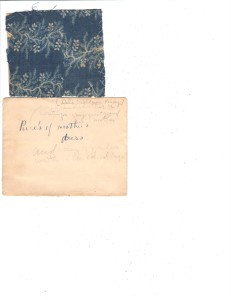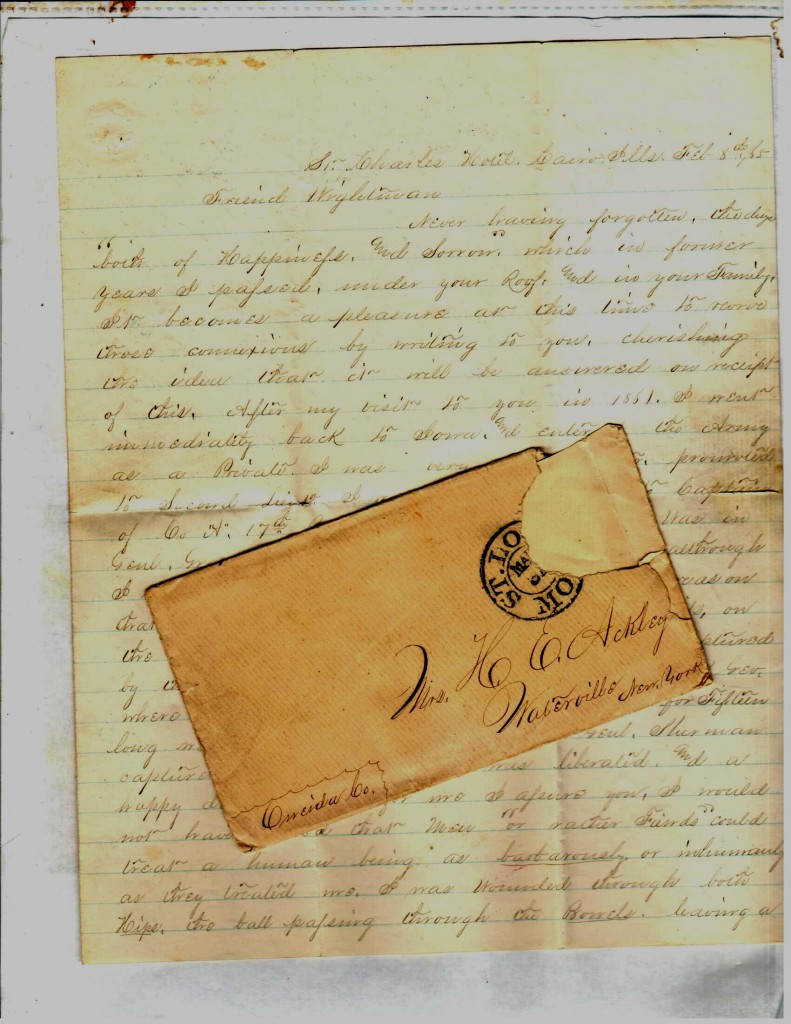1804 Eliza Riley — All That’s Left Is a Piece of a Dress and a Letter
 Eliza Riley was born May 26, 1804. She is my great great great grandmother. When she was a young girl she wore a dress of a dark blue material.
Eliza Riley was born May 26, 1804. She is my great great great grandmother. When she was a young girl she wore a dress of a dark blue material.
I have a piece of that dress.
As the Civil War came to an end Eliza and her husband Ebenezer Wightman received a letter from C. P. Johnson, relating his wartime experiences , as a prisoner of war, his liberation and his intention to return to Oneida County, N. Y. to visit once again these relatives of mine.
I have that letter and the envelope (sans postage stamp) in which the letter was sent.

Handwriting and spelling was individually distinctive with shaded pen strokes possible with a steel nib and embellishments added to words for emphasis.
This is what the letter says:
St.Charles Hotel. Cairo, Ills. Feb 8th 1865
Friend Wightman
Never having forgotten, the days”both of happiness and sorrow,” which in former years I passed, under your roof, and in your family. It becomes a pleasure at this time to renew those connexions by writing to you cherishing the idea that it will be answered on receipt of this. After my visit to you in 1861 I went immediately back to Iowa and entered the Army as a Private. I was very soon after promoted to Second Lieutenant. I was then promoted to Captain of Co. “A”, 17th Regiment, Iowa inf.try Vols. Was in Gen’l Grant’s Campaign against Vicksburg. Although I was not in at the Capture for the reason that I was severely wounded at Jackson Miss, on the 14th day of May 1863. I was then captured by the Rebels and taken by them to Atlanta Geo. where they kept me a close prisoner for fifteen long weary suffering months until Gen’l Sherman captured Atlanta. Then I was liberated and a happy day it was for me I assure you. I would not have believed that men “or rather Fiends” could treat a human being as barbarously or inhumanely as they treated me. I was wounded through both Hips, the ball passing through the bowels, having a hole through me from side to side about an inch in Diameter and oweing to their fiendish treatment I am not able to set up a moment yet. I have not lain on my back in over 20 months. I am on my way home from Dixie at this time. Shall stop in St. Louis for Surgical treatment. I am in hope that when I get there and get settled that I may recover my health. My Mother is with me. She came to me in Atlanta. How are all the the family. Delia, Hattie, Riley, and Clarke’s folks. Has the Center changed much since I was there. It was such wet weather there at the time of my visit that I could (sic) get round a great deal. Write as soon as you get this & tell all the news. Direct your letter to Capt. C. P. Johnson, St Louis Mo. Give my complements to all who inquire, if any do.
I remain Your Friend
Capt. C. P. Johnson
To Eber. Wightman
That is all I know about Eliza and her Spouse, Ebenezer. How much more there must have been to interest us in the life and times of these unexceptional people two hundred years later.
The author, David McCullough, in remarks made at a Washington D.C. Book Fair, noted how much delight historians find in the diaries, documents and letters of ordinary citizens (I’m paraphrasing.) It is the testimony of those witnesses wherein lies the worth, whose deeds are not so much in making history, but in taking note of the history being made about them. It is their commentary, often oblique, that lends color, dimension and intimacy to the historical writer’s narrative.
It is useless to guess which mementos might have been saved. They are now gone: bequeathed, dispersed, lost — or destroyed through purpose, inadvertence, or calamity — until in this, the sixth generation, all that remains is a swatch of faded blue cloth and the letter of a returning war vet.
The fact that I have even these few souvenirs is because Eliza’s daughter, Delia, saw fit to keep them safe and hand them on to her daughter, Harriett Risley Foote. Delia had stitched the piece of fabric to a bit or cardboard and had written on the back:
A piece of Eliza Riley’s dress worn when she was a girl. She was born 1804 May 26 Eliza was my dear mother (Delia Millicent Wightman Risley May 20, 1905) The cloth for the dress cost 50 cents a yard
So now these memorabilia have come down to me. And here on my MemoirSite they may find notice by others and perhaps light up the eyes of someone interested in 18th- 19th century textile design or the experiences of a P.O.W. from the War Between the States.
